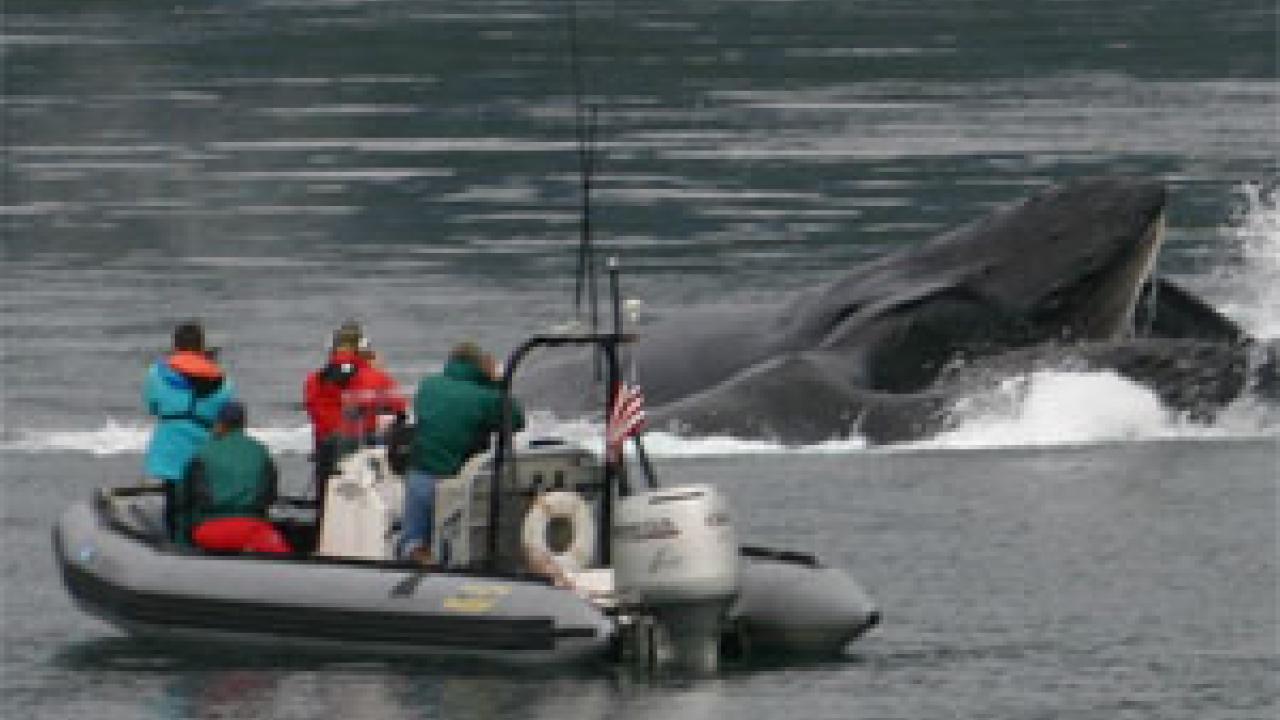The waters of Alaska's Inside Passage are abuzz. They hum with vessel sounds, ranging from the puttering of fishing boats to the rumble of cruise ships, in addition to the grunts, whistles and chirps of the resident pods of humpback whales.
Now UC Davis researchers are listening in, trying to measure the impact of boat noise on the vocal communication of these endangered whales as they forage in groups. Animal behaviorist Brenda McCowan and graduate student Sean Hanser have recently completed the first phase of a multiyear study.
According to McCowan, humpback whales are some of the most vocally diverse animals in the world, and rely heavily on vocal communication and hearing ability to interact with each other and their environment. "Humpback whales make about every sound in the animal kingdom. I've heard what sounds like elephants, lions. There are a lot of sounds that we don't know the function of."
Of particular interest to the researchers is a type of consistent vocal behavior known as feeding calls. Says McCowan, "Feeding calls may help to herd fish, or help coordinate members of a feeding group. Our hypothesis is testing whether these animals actually change the way they use feeding calls to compensate for noise."
The UC Davis researchers are collaborating on the study with members of the Alaska Whale Foundation and the Search for ExtraTerrestrial Intelligence (SETI) Institute, which is interested in nonhuman communication techniques.
Each year, they will make thousands of baseline recordings of humpback calls in the absence of vessel noise. They will compare those calls to whale vocalizations recorded when boats are systematically driven through areas where whales are present. The researchers will also outfit a handful of humpbacks with recoverable underwater microphones to record individual vocal samples and experience noise from a whale perspective.
The researchers hope that if their study reveals impacts of boat noise on humpback behavior, the results can be used to improve co-existence between whales and boaters. Information on how whales react to noise also could help prevent fishing gear entanglements and boat collisions, which are known significant impacts on humpback whale populations. The team's techniques for measuring the impact of noise are potentially applicable to other animals, both in and outside of the marine environment.
The study cost of about $150,000 is funded by the Alaska Whale Foundation, the SETI Institute, and the National Fish and Wildlife Foundation.
The University of California is one of the world's foremost research and teaching institutions, and UC Davis is the University of California's flagship campus for environmental studies. UC Davis is a global leader in environmental studies relating to air and water pollution; water and land use; agricultural practices; endangered species management; invasive plants and animals; climate change; resource economics; information technology; and human society and culture. One in six of UC Davis' 1,500 faculty members specializes in an environment-related subject.
Media Resources
Brenda McCowan, School of Veterinary Medicine, (530) 754-7373, bjmccowan@ucdavis.edu
